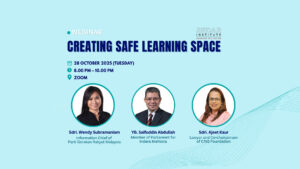Malaysia has witnessed multiple changes of government since the 14th Malaysian General Elections (GE14), however, significant institutional reforms to the country’s electoral institutions remain to be seen. The Election Commission (EC), which plays a crucial role in the electoral process, has become the subject of ongoing public scepticism regarding its independence and ability to effectively oversee the electoral process.
Several analysts have emphasised the critical need to expedite reform of the EC. Hazis (2023) contends that reforms in electoral administration are crucial for restoring public trust and confidence in the EC. A survey by Ting (2022) indicates that 55.5% of respondents believe the EC should maintain and improve the current system. However, Ting & Horowitz (2023) argue that institutional reforms under the Unity Government are unlikely due to power-sharing compromises. Ostwald (2013) states that the current system maintains institutionalised bias against the opposition, which risks increasing polarisation among Malaysians. Crucially, the latest Election Reform Committee (ERC) 2018 report, which includes 49 key recommendations for strengthening the EC (Ting, 2022), remains not fully accessible to the public. Consequently, this article will discuss how to enhance the EC’s effectiveness and restore public trust in its operations.
Current Limitations and Institutional Independence of the EC
At present, the EC’s regulatory jurisdiction remains largely confined to its original mandate. This limitation restricts its ability to address the broader complexities of election management in a rapidly changing political landscape. Furthermore, the EC operates under the Prime Minister’s Office (PMO), which compromises its independence and institutional capacity. Situated within the PMO, the EC must request staffing and budget increases through the PMO. The PMO, in turn, consolidates staffing needs from all its agencies before submitting them to the Public Service Department (JPA), limiting the EC’s ability to operate with the autonomy it requires. This arrangement raises concerns about potential political influence, undermining perceptions of the EC as an impartial body free from governmental interference. To ensure greater independence, the EC should receive its budget directly from the Ministry of Finance (MOF) or present its budget directly to Parliamentary Select Committee (PSC) as suggested by Hazis (2023), bypassing the PMO and planning its own budget. The following are suggestions for splitting the EC into three separate agencies.
Proposed Structural Changes for Greater Effectiveness
The EC currently bears an overwhelming workload, balancing operational tasks, electoral boundary delineation, and administrative duties. Given this high capacity, the ERC has proposed restructuring the EC into three separate agencies, each under the oversight of PSC, to allow for more specialised oversight and improve the overall efficacy of the electoral system (Bernama, 2020).
The first agency would be responsible for the legal and regulatory aspects of elections. This body would oversee political party registration, adjudicate disputes between parties during and after elections, and conduct audits of political party financial accounts. By consolidating these responsibilities into one agency, the EC would ensure greater consistency and impartiality in the application of election laws.
The second agency would focus on the operational side of elections, including the registration of candidates and political parties, scrutinising candidates’ qualifications, and preparing electoral materials. This agency would ensure the smooth and efficient administration of election processes, addressing day-to-day logistical challenges.
The third agency should handle the delineation of electoral boundaries, which has become increasingly contentious. Public sentiment regarding electorate delineation is a concern, with many believing that the process disproportionately favours the ruling government. A study by Yusof et al. (2015) revealed that 33% of respondents disagreed with the statement that electoral boundaries are drawn fairly and equitably. To address this, an independent expert body should be entrusted with the responsibility of boundary delineation. This would align with Article 113 of the Federal Constitution, which mandates a review period of at least eight years between reviews and specifies that reviews must be completed within two years of commencement. This agency would complete the delineation recommendations within the prescribed two-year period while also operating continuously to analyse patterns of population growth, urban development, and the availability of local infrastructure.
Finally, the findings of this delineation process should be submitted to Parliament, removing the current requirement for the report to be directly submitted to the Prime Minister. This would ensure greater transparency and minimise the risk of political interference, thereby reinforcing the integrity and credibility of the process. Hazis (2023) argues that the proposed tripartite election bodies are neither relevant nor practical, advocating instead for a single-agency model with increased autonomy and capacity. However, there are concerns that such a model could be dominated by a single administrative faction, given the current state of Malaysia’s democratic landscape.
Political Party Registration: Shifting Responsibility to the EC
To safeguard the integrity of democratic practices, political party registration should be placed firmly under the jurisdiction of the EC. At present, the Registrar of Societies (ROS), a body under the Ministry of Home Affairs (KDN), is responsible for party registration, which raises concerns about potential political interference. The ROS’s connection to the KDN has led to speculation that the Ministry may influence decisions on party registration. A case in point is the temporary suspension of Parti Pribumi Bersatu Malaysia (PPBM)’s registration before the GE14 over documentation issues, a move that critics suggest may have been politicised.
Shifting responsibility for party registration to the EC would provide a more impartial body with the mandate to scrutinise party registrations—whether for large or small parties. The EC’s expertise in electoral matters would allow it to monitor potential abuses, such as the use of smaller parties as vote-splitters in strategically crucial constituencies. Meanwhile, the ROS could focus its attention on overseeing non-governmental organisations (NGOs), a more appropriate role for an agency within the Ministry of Home Affairs.
This proposal aligns with practices in several other democracies, including New Zealand, the United Kingdom, Canada, and Australia, where electoral commissions oversee political party registration. In New Zealand, the Electoral Act 1933, in the UK, the Political Parties, Elections and Referendums Act 2000 (PPERA), and in Australia, the Commonwealth Electoral Act 1918 all grant electoral commissions the responsibility of regulating political parties. Such a framework would empower the EC to enforce stronger oversight over party finances, ensuring transparency through annual financial statements and the declaration of funds received. This shift would not only bolster the EC’s authority but also enhance the overall management and accountability of political parties.
Establishing a Comprehensive Political Financing Law
The lack of a comprehensive political financing law in Malaysia remains a pressing issue. Current regulations are limited to the Akta Kesalahan Pilihan Raya 1954 (Election Offences Act 1954), which only governs the scrutiny of candidates’ spending, and the Akta Pertubuhan 1966 (Societies Act 1966), which mandates political parties to submit financial statements to the ROS. However, neither law addresses political party expenditures comprehensively.
Recent discussions on political financing, as reported by the Prime Minister’s Department (Law and Institutional Reforms) indicate that there are ongoing debates regarding the key aspects of Malaysia’s political financing laws (Jawapan Lisan No.60, February 2025), but these have yet to translate to a firm commitment to reform. A well-designed political financing law should allow political parties to transparently receive funds from private or corporate sources while prohibiting foreign donations. Provisions should also include limits on the amount of donations, categorised as in other countries. For instance, the UK requires that donations and loans over £500 be declared, with any anonymous donations limited to £50, and the party’s donations are recorded on its EC website. In Canada, individual donations are capped at $1,750 per year, with anonymous donations capped at $20. Registered associations in Canada cannot donate more than $1,750. Similarly, New Zealand mandates that donations, contributions, and loans over $1,500 to candidates and over $15,000 to political parties must be declared, with the names and addresses of donors. Under such a framework, the EC would be responsible for monitoring the financial statements of all political parties and releasing annual reports on their financial activities, ensuring greater transparency.
The joint workshop between The Institute for Democracy and Economic Affairs (IDEAS) and the secretariat of the All-Party Parliamentary Group (APPG) has highlighted that Malaysia’s political financing regime is one of the least regulated in Asia. This calls for a more robust framework, which aligns with the proposed restructuring of the EC into three separate agencies. One of these agencies would be tasked with overseeing, regulating, and enforcing the financial disclosures of political parties. The workshop proposed that public funds should be allocated to political parties, set at 0.05% of the national budget to a party that won 1 seat or secured 2% of the total valid votes cast in the country. The amount may be subject to debate, but in principle this funding model would reduce political parties’ reliance on private donations, promoting a level playing field.
Conclusion
The EC has successfully managed 15 general elections, as well as by-elections (PRK) and state elections (PRN), contributing to Malaysia’s long-term political stability. However, to meet the growing demands for more effective management of political party operations and to enhance public trust, significant reforms are necessary. These reforms would ensure that the EC operates with greater independence, transparency, and efficiency, strengthening Malaysia’s democratic system.

Author
Khairul Syakirin Zulkifli

Author
Sim Why Jean





